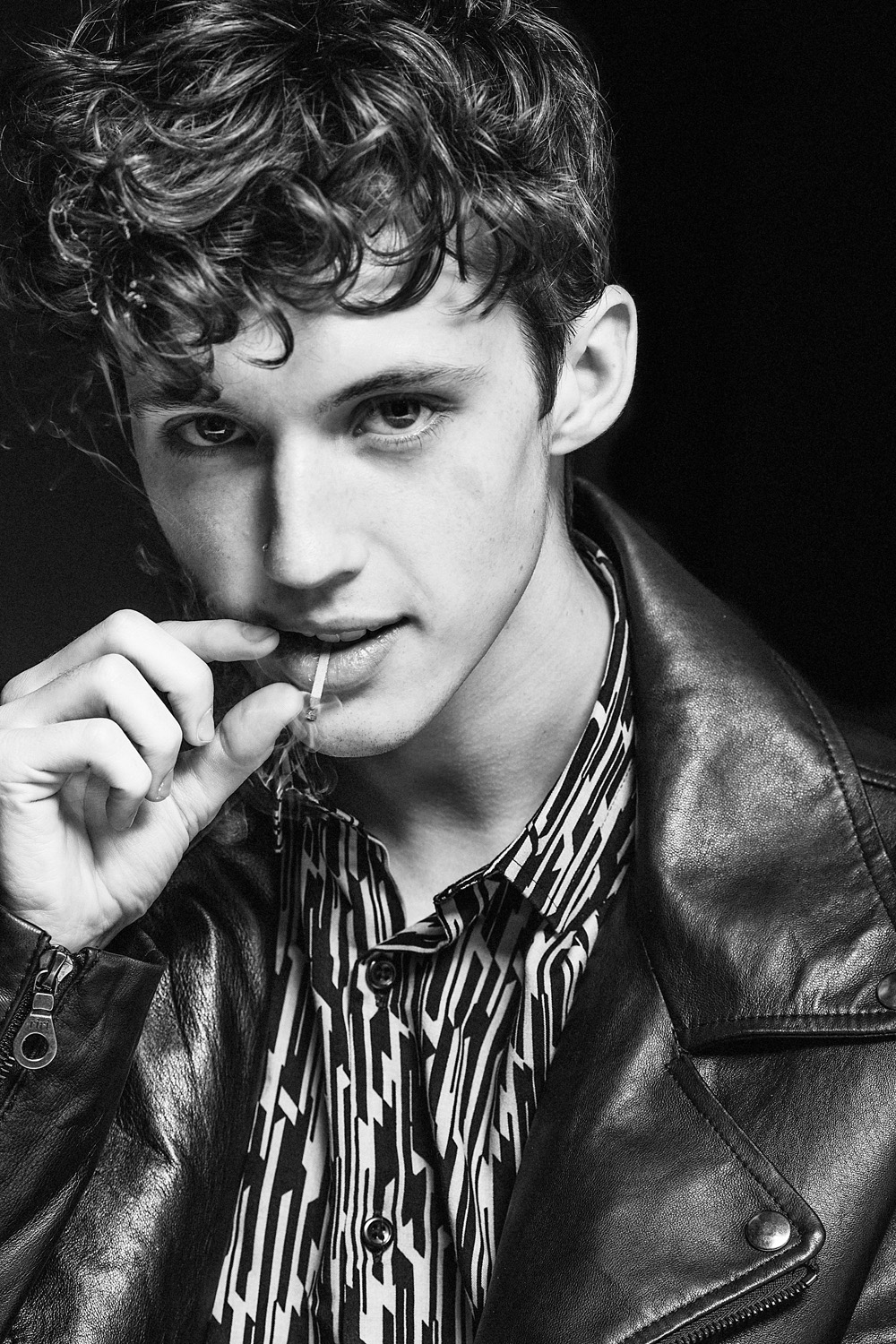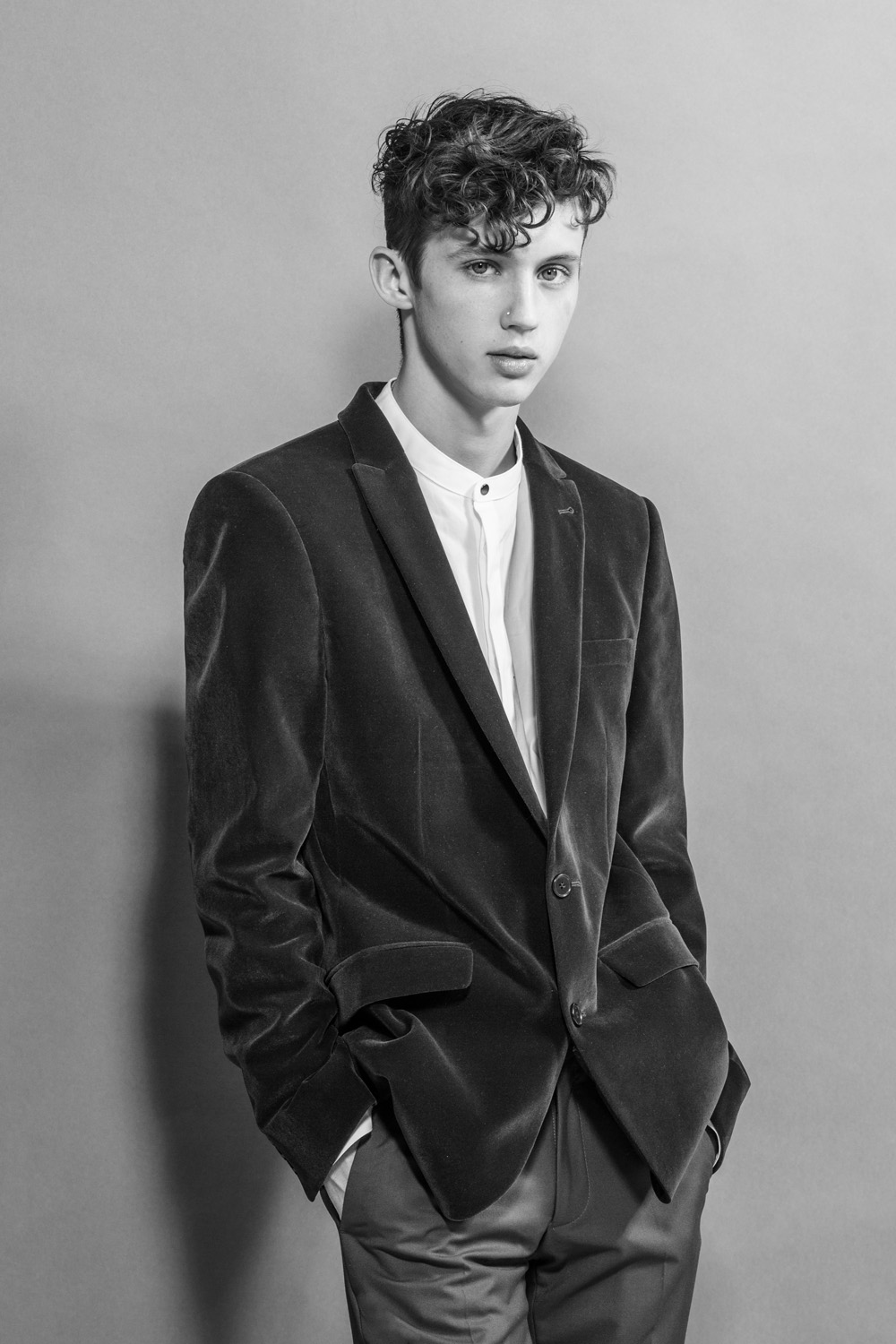
photos / Isaac Sterling
styling / Wilford Lenov @ Celestine Agency
grooming / Stephanie Hobgood @ Exclusive Artists Management
using Bumble & Bumble
production / Erica Russell
story / Ian Monroe
There’s a new breed of culture stars emerging, ones that will likely define a generation, if not the future. They come with the recent proliferation of social media platforms like Vine, Instagram, and YouTube. With their dedicated followers in tow, these new influencers have started breaking out into other spheres. Few better represent this new wave than pop’s freshest face Troye Sivan.
The 20-year-old Australian with ice-blue eyes, pouty lips, and perfectly disheveled hair was made to be in front of a camera. In 2012, Troye started vlogging on YouTube about the things that consume adolescent minds: music, pranking your parents, and, well, mostly sex. Prior to that, he was uploading only covers of songs: “The One That Got Away” by Katy Perry, “Love Is A Losing Game” by Amy Winehouse, and “Hold It Against Me” by Britney Spears, to name a few. Turns out he was made for the microphone, too. It was ultimately when he posted an original track that he caught the ears of record execs. “I uploaded a song called “Fault In Our Stars” based off the John Green book. I wrote and produced that, and [EMI] found it online.”
After signing, Troye released his debut EP, TRXYE, in 2014, which saw mediocre commercial success, but fell short of the spark he’s known for now. Determined to create a fully realized record, Troye spent the next year shuffling back and forth between Perth and L.A., working with a close crop of collaborators-turned-friends that included Alex Hope (“she was my main collaborator”), Allie X, Leland, Jack Antonoff, Betty Who, Tkay Maidza, and Broods.
By last September he was ready to reintroduce himself with Wild, an impressive EP-precursor to December’s full-length, Blue Neighborhood. Together the releases topped the iTunes charts of 31 countries, with Wild becoming the first EP to ever debut at number one on the Australian album charts. The ten tracks present pop at it’s most carefree (“Wild,” “Cool,”) and most devastating (“Talk Me Down,” “Heaven,” “Lost Boy”). The support it’s found from his contemporaries has been unending, and unsurprising.
Gone are the days of Mariah-Carey-I-don’t-know-hers and in their place a community ready to recognize talent. His greatest shout outs have come from the likes of Adele, Taylor Swift, Sam Smith, and, the greatest of all to any 90s baby, Lindsay Lohan. “WILD IS STUNNING AND AWESOME,” tweeted Taylor. “His voice does things to my body,” said Smith, who followed up with lyrics from “Bite,” a track about the predatory, albeit liberating, nature of gay clubs.

As an openly out singer, Troye often writes often about his relationships, and if the gender specific pronouns weren’t enough, he has a track titled “for him,” all about the clichés of falling in love. When I first met Troye, around the time of his first big media push, I asked if he was worried about being labeled a “gay artist.” His answer was simple: “Nah, I am gay.” He said it so nonchalantly that I felt embarrassed to have suggested it, and worse that I had offended him. He shrugged it off with, “I just think people are going to, if they haven’t already, think of it as so much less of a big deal. It’s starting to be treated like it should be: a part of someone, but not their entire shtick.” While gay visibility is not his “shtick,” it still is a part of his mission.
Despite the progress we’ve made as a society, we’re still far from eliminating the confines of the proverbial closet. Too often disownment, rejection, and abuse, or worse, plague the narratives of growing up queer. That missing message of acceptance is not lost on Troye. His trilogy of music videos for tracks “Wild,” “Fools,” and “Talk Me Down,” tackle the blossoming romance of two boys, life-long friends, and the painful fallout caused by a close-minded father. “I really wanted to show an innocent LGBT relationship. I feel like gay relationships are so sexualized. When you see a little boy and a little girl walking down the street, and holding hands it’s like ‘aw cute,’ but you never see it with two boys. It’s kind of portraying what it’s like before you realize there’s anything ‘wrong’ with you.”
They aren’t the sorts of superficial, ready-to-go-viral, videos we’ve come to expect. In a greater sense, they’re for anyone struggling with intolerance. They’re for others, too: “I’m excited for parents to watch the videos. I’d say that those are the people I want to target most. I think it just shows that reactions are so important, and can completely shift a person’s life.”
Growing up on both the computer and silver screen—he had a bit part in X-Men Origins: Wolverine and a feature role in the Spud trilogy—has clearly taught Troye the power of a visual message. It’s also given him a higher level of self-awareness than most his age. This June, he turns 21, the universal threshold of adulthood, so naturally the question of how he will shed the remnants of his adolescent image comes up.
“I think what it comes down to is that I see youth as kind of a really—I think maybe the Disney channel version of youth is cheesy, and something I would want to shake, but I don’t feel like that’s what it is for me. Youth is making mistakes, doing stupid things, and doing whatever you want because you don’t have all of the responsibilities yet of a grown adult. It’s moving away from your home for the first time. It’s your relationships. It’s all of those things. I don’t see it as a cheesy thing that I want to shake. I see it as a really cool thing that I want to embrace while I can.”

That lack of desire, or need, to have some big transition is best seen in Troye’s recent cover feature in the Australian edition of Rolling Stone. There, he beams proudly in a photo with his mom, dad, two brothers, and sister. Meanwhile, the band 5 Seconds of Summer are standing naked on the cover of the magazine’s U.S. edition, and bluntly talking hooking up with groupies, in what is a thinly-veiled attempt at trying to appeal to the male demographic. It didn’t work, and, if anything, it completely backfired, causing uproar online, with many calling the article sexist and disgusting.
With a new wave of pop star comes a new wave of music fandom, one similarly born and bred in online sharing platforms, and one built on authenticity and honesty, not pomp and persona. The diehard followers of today’s stars are wiser to the ways of public relations phoniness and media manipulation. As content creators themselves, they have a particularly keen sense for bullshit. With Troye, they get it all: the highs and lows, the polished and candid.
“I guess I put myself out there, warts and all. I haven’t tried to make myself seem like… I think it’s clear to everyone that I’m not a perfect person. I’ve never tried to make it seem any other way.”
The relationship between artist and fan is now based on something other than idolatry. Troye’s follower’s aren’t transfixed by the thrust of his hips, like maybe Justin Bieber, but instead won over by a connection—perceived or real—that they’ve made. At the end of the day, the fans only need to know that he’s as dedicated to them as they are to him, and on his latest lead single, he promises them it all: “My youth, my youth is yours.”





